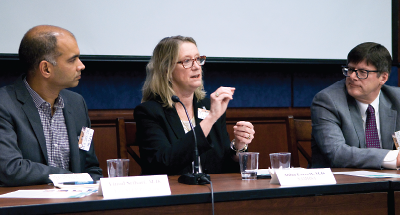NAMI Holds Briefing on Value of Mental Health Block Grants
Abstract
A Capitol Hill briefing showcased the rise and success of early psychosis programs and how block grant funding has helped make a large impact in many communities.
By any measure, psychosis is a serious public health problem, according to Robert Heinssen, Ph.D., director of the Division of Services and Intervention Research at the National Institute of Mental Health (NIMH). That includes the costs associated with incarcerating or hospitalizing people with schizophrenia, the lost productivity as young adults with emerging psychosis leave the workforce, or the significant mortality gap these patients face.

Anita Everett, M.D., notes that mental health block grants have helped increase the number of early psychosis programs from 12 to over 100 in the past decade. She is flanked by Vinod Srihari, M.D., and Robert Heinssen, Ph.D.
But early interventions can help stem this problem as well as reduce patients’ incapacity, said Heinssen at a Capitol Hill briefing last month in which the potential of early psychosis programs and the importance of mental health block grants in realizing that potential were discussed. The briefing was hosted by the National Alliance on Mental Illness (NAMI).
Heinssen spoke about the seminal RAISE (Recovery After an Initial Schizophrenia Episode) project. RAISE, initiated in 2008, is a comprehensive research program that is assessing the effectiveness of coordinated specialty care (CSC) to help people with early psychosis recover. The initial clinical studies found that CSC is feasible, scalable, and effective, especially if individuals are treated within 18 months of their first psychotic episode.
The initial studies are completed, but researchers across the country are still analyzing data from RAISE to test new ways of improving patient care and finding patients as early as possible.
One such researcher is Vinod Srihari, M.D., an associate professor of psychiatry at Yale University and director of the Specialized Treatment Early in Psychosis (STEP) program, which provides psychosis care to 10 towns in the New Haven, Conn., area.
In discussing the cycle of psychotic illness and recovery, Srihari noted that while the supply side of treatment (that is, lack of practitioners) is a major obstacle, there are problems with demand—people experiencing early psychosis may be unaware of their illness or that help is available.
Srihari talked about a new initiative called MindMap to overcome this demand bottleneck. This initiative employs marketing approaches to disseminate clear messages to the community about the symptoms of psychosis and where people can reach out for information or help. In addition, since many patients seeking help lose interest because the response from health care professionals is slow, MindMap staff focus on rapid access, with the goal of getting patients screened and referred within 24 hours.
Innovative strategies like MindMap can be difficult to fund, and that’s why NAMI chose to couple the discussion on early psychosis programs with a primer on the Community Mental Health Services Block Grant (MHBG) program.
The MHBG program is a vital support mechanism for mental health service programs like early psychosis clinics and is administered by the Substance Abuse and Mental Health Services Administration (SAMHSA). It provides funds and technical assistance to the states, District of Columbia, Puerto Rico, U.S. Virgin Islands, and U.S. Pacific jurisdictions to support comprehensive, community mental health services. For Fiscal 2017, the SAMHSA budget included $533 million for the MHBG grants, which are noncompetitively divided among the states and territories based on the estimated at-risk population for mental illness.
The recipients have leeway in how they spend the money, although a provision added by Congress in 2015—due in no small part to the success of the RAISE trials—mandates that 10 percent of each grant must be set aside specifically for early psychosis intervention programs.
At the briefing, SAMHSA Medical Director Anita Everett, M.D., told the audience that the block grants are a small but vital part of a state’s health care funding.
“They provide flexibility to implement new, evidence-based strategies that are not covered by insurance,” said Everett, who is also APA president. She noted that having a roughly $50 million set-aside budget for the entire United States may not seem like much, but it’s enough to help psychosis initiatives take one step forward; for example, it can help turn a concept into a pilot project, grow a pilot into a full-scale program, or help a recently implemented program achieve sustainability.
Data at the national level are bearing this out, noted Heinssen. Before 2008, there were only 12 early psychosis programs in this country. By 2016, that number had grown to 114, and NIMH estimates it may reach 200 programs by the end of 2018. Heinssen also noted that NIMH is working at unifying these programs into an early psychosis intervention network, or EPINET. This network will further advance treatment knowledge by sharing data and developing standardized measures of care.
While such statistics are impressive, individual stories of success help drive home the message that early psychosis intervention works, and the NAMI briefing did that by closing with Maggie, a 22-year-old with psychosis who participated in one of the RAISE trials. She discussed her struggles with auditory hallucinations and how the support she and her family received from the coordinated care team made a tremendous difference.
“I’m 22, I just graduated from nursing school, and I’m looking for a job,” she said. “Just like everyone else my age.” ■



